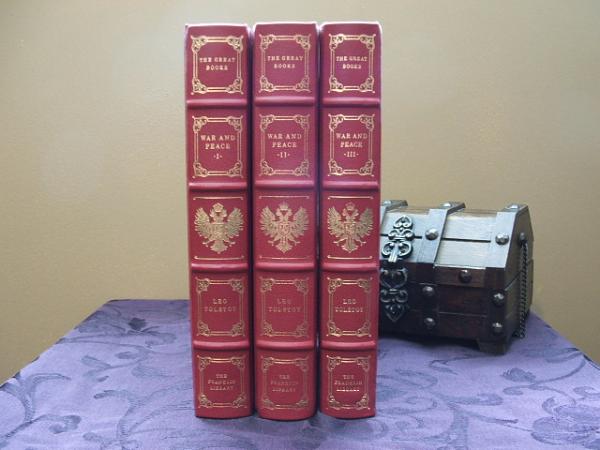Easton Press Leo Tolstoy books
War and Peace - 100 Greatest Books Ever Written - 1981
Franklin Library Leo Tolstoy books
The Kreutzer Sonata and other stories - Collected Stories of the World's Greatest Writers - 1983
War and Peace - Great Books of the Western World - 3 books 1984
Leo Tolstoy biography
Leo Tolstoy, born on September 9, 1828, in Yasnaya Polyana, Russia, was one of the most influential novelists and thinkers of the 19th century. His works, which include epic novels, philosophical essays, and moral treatises, continue to captivate readers around the world with their profound insights into the human condition and timeless relevance. Tolstoy was born into a noble family and spent his early years immersed in the traditions and culture of Russian aristocracy. Despite his privileged upbringing, Tolstoy developed a deep empathy for the common people and a keen awareness of the social injustices prevalent in Russian society. These themes would later permeate much of his writing and philosophical thought.
Tolstoy's literary career began in the 1850s with the publication of his autobiographical trilogy, Childhood, Boyhood, and Youth, which depicted his formative years and marked the beginning of his exploration into the complexities of human experience. However, it was his masterpiece, War and Peace, published between 1865 and 1869, that solidified his reputation as one of the greatest novelists of all time. War and Peace is a sprawling epic that chronicles the lives of Russian aristocrats during the Napoleonic Wars. Through its vivid characters, intricate plotlines, and profound meditations on history, fate, and the nature of humanity, Tolstoy crafted a work that transcends its historical setting to offer timeless truths about the human condition. Following the success of War and Peace, Tolstoy embarked on another monumental work, Anna Karenina (1877). This tragic tale of love, betrayal, and societal expectations further established Tolstoy's reputation as a master storyteller. His acute psychological insights and nuanced characterizations revealed the depths of human emotion and the complexities of moral dilemmas.
In addition to his literary achievements, Tolstoy was also a prolific essayist and philosopher. In works such as What Is Art? (1897) and The Kingdom of God Is Within You (1894), he explored themes of spirituality, morality, and the pursuit of a meaningful life. Tolstoy's ideas on nonviolent resistance, simple living, and the rejection of material wealth would later influence figures such as Mahatma Gandhi and Martin Luther King Jr.
Tolstoy's later years were marked by a profound spiritual and moral awakening. He renounced his earlier works of fiction and devoted himself to a life of simplicity, pacifism, and religious devotion. His attempts to live in accordance with his beliefs, including his rejection of private property and his advocacy for communal living, garnered both admiration and controversy. Leo Tolstoy passed away on November 20, 1910, at the age of 82, but his legacy endures as a towering figure in world literature and philosophy. His ability to capture the complexity of human experience, his commitment to social justice and moral integrity, and his profound insights into the human soul continue to inspire readers and thinkers across generations. Tolstoy's enduring impact serves as a testament to the power of literature to illuminate the human condition and provoke reflection on the deepest questions of existence.

Comments
Post a Comment
Share your best book review and recommendation